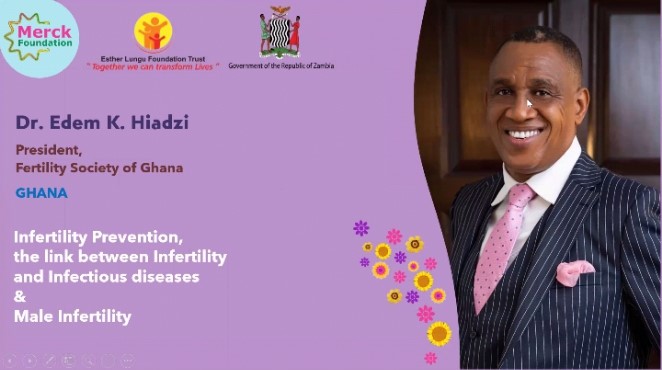April 29, 2021
By Boris Esono Nwenfor

The UK National Institute for Clinical Excellence (NICE) describes infertility as the inability to conceive after 2 years of unprotected intercourse, while other statistics will have 1 year. And according to Dr Edem Hiadzi, “infertility is not a stigma.”
The Consultant Obstetrician/Fertility Specialist at Lister Hospital and Fertility Centre, Accra-Ghana was speaking April 29 during the Merck Foundation Community Awareness Program: Health Media Training 2021 held virtually. It is part of the Merck Foundation Africa Asia Luminary.
“Media are the mouthpiece of the people. When they have a better understanding of the situation, they can easily educate the population,” Dr Edem Hiadzi said as he presented on infertility prevention.
“Infertility is not a stigma. The men should support their wife as the reason may be from the man’s end and not from the woman. Infertility affects both the male and female and it is 50-50.”
According to the Delhi IVF Fertility Research Centre, infertility affects one in six couples in India and the recent National Family Health Survey data estimated that 3.8% of currently married women between 40 and 44 years are childless. The statistics according to Dr Hiadzi shows that the prevalence situation in the USA is at 10%, UK 6% while infertility rate in Sub-Saharan Africa is at 20-30%.
In addition to the higher prevalence of overall infertility in developing countries, there are significant differences in the primary and secondary infertility rates. Secondary infertility is much more common in resource-poor countries, especially in Africa and Latin America and among middle- and high-income couples.
“Infertility is a major cause of marital disharmony in Africa and it exposes women especially to ostracization, social discrimination and physical violence. Infertility is a shared responsibility and this has to be taken very seriously,” Dr Edem Hiadzi, Fertility Specialist at Lister Hospital and Fertility Centre, Accra-Ghana.
Various factors have been identified to be causes of infertility. Alcohol, tobacco and caffeine consumption have all been shown to compromise fertility and all of these are widely used in developing countries. Dietary deficiencies of iodine and selenium have been linked to infertility as has been exposure to dietary aflatoxin.

Cultural beliefs like early marriage, polygamy, an aversion to female education and antagonism to condoms further contribute indirectly towards infertility. There is also a disparity between rural and urban areas in the number of healthcare facilities and access to health care. Societies in which fertility is given a very high value can lead to women undergoing all kinds of unproven treatments to get a child, and these may result in further damage to reproductive potential.
Dr Edem further highlighted some key [points that can prevent infertility which involves avoiding high temperatures as “this can affect sperm production and motility.” “Although the effect is usually temporary, avoid riding motorbikes, not tubs and steam baths – instead use showers and wear loose pants,” He added.
